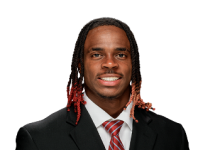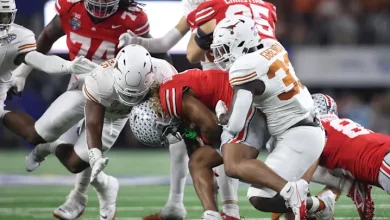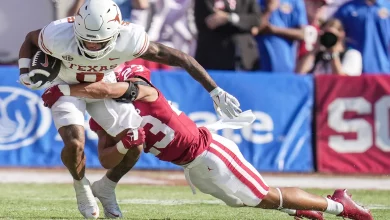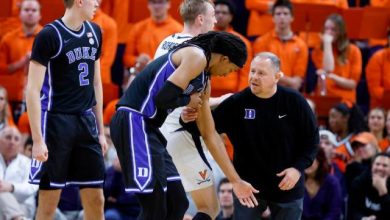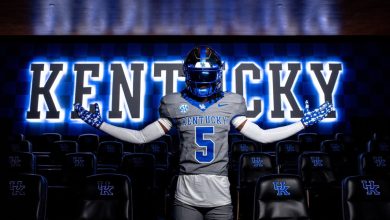Former Tennessee Vols edge rusher James Pearce was asked one of the worst questions in sports media and he had a perfect response
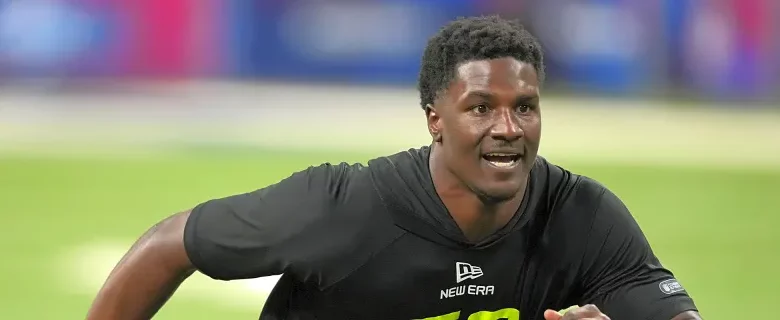
James Pearce Jr., the standout edge rusher from the University of Tennessee, had an outstanding collegiate career. Known for his explosive performances on the field, Pearce racked up impressive statistics over his three seasons with the Vols, securing 71 tackles, 30 for loss, and 19.5 sacks. As one of the top defensive prospects entering the 2025 NFL Draft, Pearce was primed for success. However, like many athletes, his journey to the pros was marred by negative media attention—one of the most notable moments being when he was confronted with one of the most absurd questions an athlete can face during the pre-draft process.
While Pearce’s performance on the field spoke volumes, some media outlets attempted to derail his image by circulating baseless rumors about his character. These included unverified accounts and allegations from a former high school teammate, which painted Pearce as having “anger issues.” The media attention quickly turned from his impressive athletic career to these unfounded accusations, overshadowing his years of hard work and dedication.
The moment that truly encapsulated Pearce’s ability to handle adversity came during Tennessee’s Pro Day. This was a key event where NFL scouts and media outlets alike were looking for Pearce to confirm his potential as a top draft pick. As Pearce was being questioned, one reporter threw a curveball: a question not about his skill or readiness for the NFL but about his alleged character flaws. Instead of engaging in defensive rhetoric or getting rattled, Pearce delivered a response that would be remembered as a textbook example of grace under pressure. He calmly stated, “I’m a great guy. I’m a great teammate, a great player. I’m a people person. I’ve got a good heart.”
His answer was perfect—not just because it was composed, but because it shifted the narrative back to what truly mattered: his on-field abilities and his character as a person. Pearce’s response was not just a rebuttal to a careless question; it was an assertion of his identity and his worth, built on the foundation of the work he’d put in on the field and the relationships he’d built off it.
The Impact of Character Questions in Sports
In the sports world, the line between reporting and sensationalism can sometimes blur. Media outlets often feel the pressure to create stories that will engage audiences, even if those stories are not entirely substantiated. Pearce’s situation illustrates this phenomenon all too well. The rumors about his character—based on an isolated incident and hearsay—served to detract from his football talent and painted him unfairly as a risk. This kind of reporting is not only unethical but also dangerous. When athletes are evaluated based on rumors rather than facts, they face undue harm to their reputations and careers.
This is especially true when we consider how much the media can shape public opinion. For NFL scouts and general managers, the pre-draft process is not just about looking at an athlete’s physical prowess on the field. They also consider an athlete’s personal life, background, and temperament. Unfortunately, without a fair and thorough evaluation, character concerns can cause a player’s draft stock to plummet. The question posed to Pearce was an example of the kind of misinformation and speculation that can influence such decisions, and Pearce was the victim of it.
In this case, the insinuation that Pearce might not be mature enough to handle the rigors of the NFL was damaging. Despite being a college star, the allegations could have caused teams to hesitate before drafting him. This is why Pearce’s response was so important—it allowed him to take control of the narrative and demonstrate that he was not the person the media was trying to make him out to be.
The Strength of Pearce’s Response
What made Pearce’s response truly remarkable was his ability to rise above the question without being combative or defensive. In these types of situations, athletes are often put on the spot, expected to respond to questions that they may not feel are fair or relevant. It’s easy for emotions to take over, leading to frustration or anger. Pearce, however, exhibited remarkable poise and maturity. By keeping his answer simple, confident, and rooted in his true self, he managed to turn a potentially negative situation into an opportunity to assert his character.
This response was not just for the media, but also for the scouts and coaches who were evaluating him. They were watching closely to see how he would handle the pressure, knowing that their decisions would impact his future. Pearce, by addressing the question directly and with respect, showed that he was not only ready for the NFL in terms of his physical skill but also in terms of his mental maturity.
It is also worth noting that Pearce’s response was in line with what his coaches and teammates had said about him. Tennessee head coach Josh Heupel, in particular, defended Pearce, emphasizing his growth both as a football player and as a person. Heupel highlighted Pearce’s leadership on the field and his commitment to continuous improvement. These endorsements from those who knew him best only reinforced Pearce’s statement, helping to counterbalance the baseless rumors that had been circulating.
The Dangers of Unverified Reporting
Pearce’s story is a stark reminder of the power the media holds over an athlete’s career and the importance of responsible journalism. While athletes are public figures and their personal lives may inevitably come under scrutiny, it is crucial that media outlets ensure they are reporting facts, not spreading unfounded rumors. The line between curiosity and exploitation can be thin, and in many cases, the impact of speculative reporting can have far-reaching consequences for athletes.
For Pearce, it wasn’t just a matter of defending his reputation. It was about showing the world that he would not let false narratives define him. In the case of the media’s focus on his character flaws, the absence of any substantial evidence was glaring. And yet, despite the uncertainty and the potentially damaging consequences of those rumors, Pearce remained confident in his response.
The Importance of Resilience in Professional Sports
Pearce’s experience provides a valuable lesson in resilience and professionalism for athletes at all levels. The reality of being in the public eye is that you will inevitably face criticism, sometimes unjustly. How you handle those moments defines not only your personal character but also your professional growth.
Pearce’s ability to rise above the petty distractions of media rumors demonstrated that he was ready for the challenges that lay ahead in the NFL. His focus remained on what he could control: his preparation, his performance, and his mindset. These are qualities that every aspiring athlete can take to heart.
James Pearce Jr. was ultimately selected by the Atlanta Falcons in the first round of the 2025 NFL Draft, solidifying his place among the league’s elite prospects. His journey from being unfairly scrutinized by the media to becoming a first-round pick serves as a powerful reminder of the importance of character, resilience, and the ability to overcome adversity.
As Pearce embarks on his professional career, it is clear that his ability to navigate challenges—both on and off the field—will serve him well. His response to one of the worst questions in sports media is a testament to his strength and poise, qualities that will undoubtedly define his future success. In the end, Pearce proved that no matter how loud the noise around him became, his worth was always rooted in his actions, his dedication, and his unwavering belief in himself.


